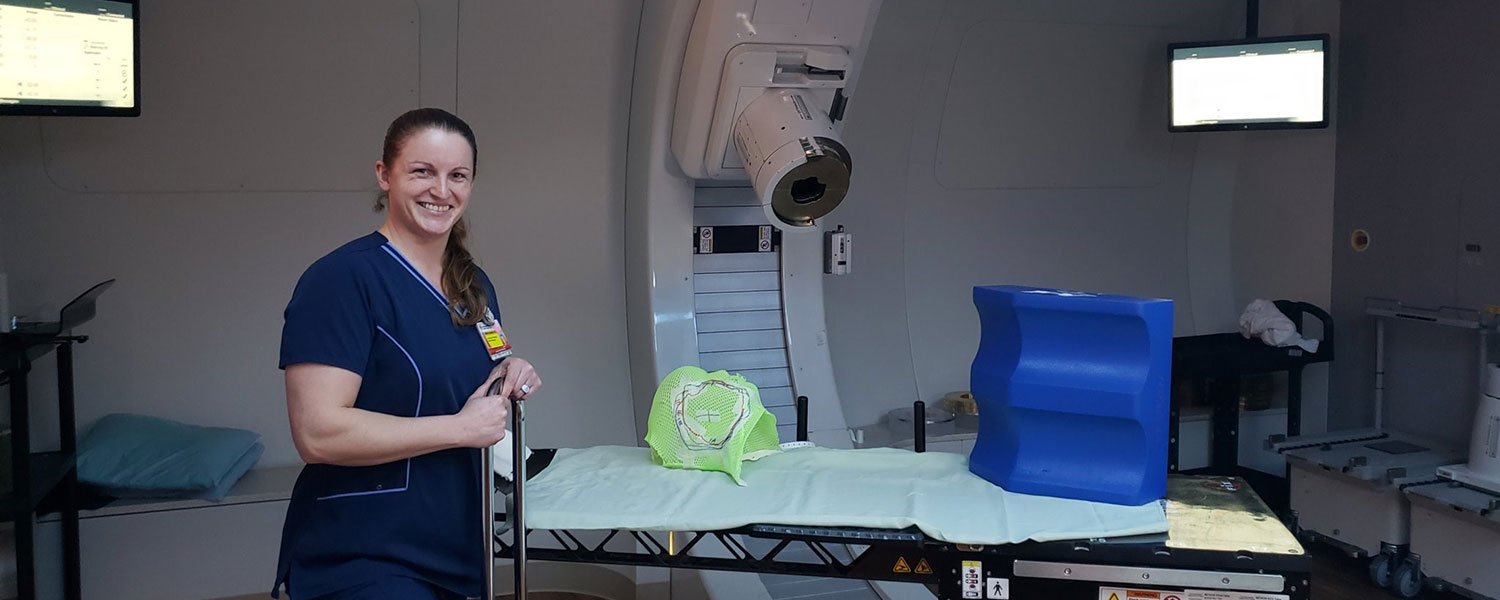In July 2016, Jill Cofojohn became the first radiation therapist in Ohio to use proton therapy to treat a cancer patient. This noteworthy event took place at University Hospital’s Seidman Cancer Center in Cleveland, where she worked as the advanced lead radiation therapist.
Nine years later, Cofojohn – a Kent State Salem graduate – helped introduce this technology in Columbus, where she now serves as the lead proton therapist at The Ohio State University (OSU) Wexner Medical Center. There are only three such sites in Ohio and 46 throughout the United States.
Proton therapy is an advanced form of radiation treatment that uses protons rather than X-rays to destroy cancer cells. Cofojohn explained that it targets tumors and minimizes the damage to surrounding healthy cells, which can lead to fewer side effects and secondary cancer rates.
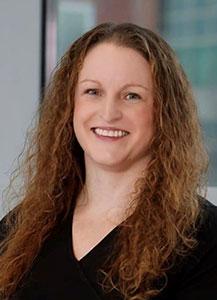
Cofojohn graduated from Kent State Salem in 2007 with an associate degree in radiologic technology, followed by a bachelor’s degree in radiation therapy in 2008.
Her career in this field began soon after graduation when she moved to Bloomington, Indiana. There, she learned the techniques of proton therapy at Indiana University Health Proton Therapy Center and was the first proton therapist hired to run the facility’s late shift.
After being there for five and a half years, Cofojohn got the urge to move back to Ohio when she learned that University Hospitals in Cleveland planned to open a proton center. “I wanted to utilize my experience to introduce proton therapy to Ohio,” she said.
And the rest is history.
As the first radiation therapist to use proton therapy in Ohio, Cofojohn can recall exactly what that moment meant to her, because she recorded her thoughts in writing after that first treatment.
“It’s not every day you go to work knowing you will be taking part in history. In this crazy and scary world we live in, it is truly an honor and a blessing to be part of something that will impact the future so positively. I can’t believe this day has finally come. All the hard work, stress and dedication have come down to this day,” she wrote.
“Two years ago, I moved home with the hope (of) bringing miracles to Ohio with the power of protons. I hoped to bring my knowledge and experience home to show others what proton therapy can do. … This day will change the lives of so many people near and far.
“Today, we give patients hope. Hope for the fight of their life. Hope to the hearts of their loved ones. Hope that we can make a difference against such a terrible disease, like cancer. Hope straight to the ‘heart of it all.’ Today, proton therapy comes to Ohio!”
Not one, but three Kent State grads
When Cofojohn left University Hospitals and headed to Columbus, it was to help start up the new proton therapy center at the Ohio State University Wexner Medical Center’s James Outpatient Center.
Today, she is in charge of two operating treatment rooms at the new proton center there, featuring the latest technology and highly sophisticated equipment used for treatments and research. She said that she is focusing on expanding the new proton center at the center.
“This type of machine setup was the first installed in the world,” she noted. “It combines using multiple rooms with a smaller cyclotron to reduce the space needed. … The benefits of proton therapy are more pronounced in treating the pediatric and young adult populations.”
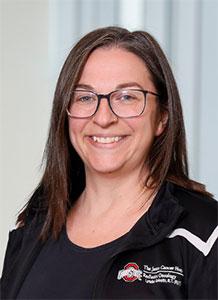
But Cofojohn is not the only Kent State Salem graduate to be working at this facility. Her colleagues include fellow lead proton therapist Lyndsie (Schultz) Tenney and proton therapist Jenna George, each a graduate from Kent State Salem.
Tenney received an associate degree in radiology technology in 2008 and a bachelor’s degree in radiation therapy in 2009. Likewise, George received her associate degree in radiology technology in 2015 and her bachelor’s degree in radiation therapy in 2017.
“Together, we make sure each treatment room runs smoothly and work to improve and create processes for the proton therapists,” Cofojohn explained. “Lyndsie and Jenna are extraordinary therapists who exemplify compassionate care and really relate well with our pediatric patients.”
Prior to her position at the Ohio State facility, where she too is in charge of both treatment rooms, Tenney spent six years as a lead radiation therapist at the James Cancer Hospital in Columbus and five years as a staff therapist for Mercy Health in Youngstown/Boardman.
George also worked previously as a radiation therapist at the James Cancer Hospital for seven years and as a radiologic technologist at St. Elizabeth’s Hospital in Boardman for two years.
Cofojohn pointed out that additional graduates of the Kent State Salem radiation therapy program are also making a difference across the state. “There are several Kent State alumni who are currently or have been part of the proton center at UH in Cleveland,” she said. “I was able to leave UH knowing that the proton center was in such capable hands with Mitch Lewis, a 2014 radiation therapy graduate, taking over my role there after being a crucial part of the team since the beginning.”
Why radiation therapy?
For Tenney and George, choosing this profession was quite personal.
“My passion for the field of radiation therapy began when I was 13 years old,” George said. “At the time, my mother was undergoing radiation treatments, and the therapists were kind enough to show me the treatment room and explain how the machine worked. That experience left a lasting impression on me and sparked a deep interest in the field.”
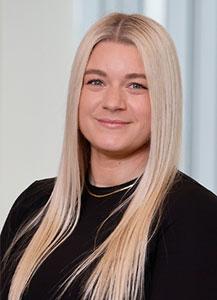
Two years later, her mother had to undergo another round of chemotherapy and radiation. Coincidentally, she received those treatments at the Ohio State facility where George now works.
“During this difficult period, the compassion and care shown by the radiation therapists made a profound impact on both of us. In her final days, their kindness and professionalism stood out to me and inspired a clear goal: to pursue a career in radiation therapy and one day work at OSU,” George shared. “Achieving that goal was an incredibly meaningful moment for me, not only professionally, but personally. I felt I was honoring my mother’s memory and continuing a journey that began with her.”
Tenney said that she “fell in love with radiation therapy” after her grandmother was diagnosed with cancer. “From there, a deeper love grew with the X-ray program at Kent State Salem and my clinical rotations. I just knew in my heart of hearts that radiation oncology was where I belonged.”
For Cofojohn, being a radiation therapist is also about personal relationships. “I knew I wanted to get into healthcare and the radiologic technology program at Kent State Salem was there for me,” she said. “When I rotated through radiation therapy during my clinicals, I fell in love with how much radiation therapists get to know their patients.”
From small campus to big roles
As with most students on Regional Campuses, these three radiation therapists each noted that they chose Kent State Salem because it was “close to home” as well as the quality reputation of its radiology and imaging sciences programs.
The Kent State Salem Campus is only one of two colleges in Ohio that offer a bachelor’s degree in radiation therapy (the other is Ohio State). It has multiple partnerships with hospitals and cancer centers throughout Northeast Ohio and is nationally accredited.
“During the program at Kent State Salem, I was sent to work two semesters at University Hospital in Cleveland, and being at that large of a cancer center prepared me to come to OSU,” Tenney said.
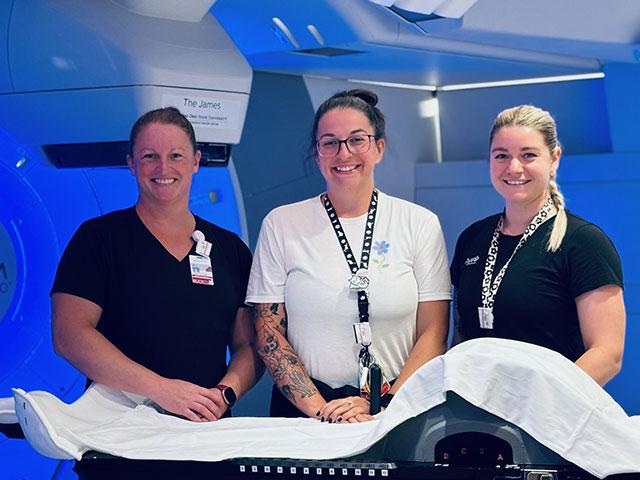
“It taught me to be prepared for anything that may come through the door.”
Cofojohn said that the Salem Campus program laid the foundation for her career. “I learned the basics of everything I needed to know to thrive in the healthcare industry. I felt prepared for my career and passed the registry with flying colors.
“Kent State Salem not only provided me with an excellent education, but I was also able to make lasting connections and friendships during my time there,” she continued. “Radiation therapy is a very small field, and I truly believe I am where I am today because of the teachers, program directors and alumni.”
George agreed. “The instructors and staff in the radiology program are incredibly knowledgeable and provided thorough preparation across each modality,” she noted. “After completing the X-ray program, it was an easy decision to continue my education by enrolling in the radiation therapy program.”
While the former students are quick to heap praise onto the faculty and program personnel on the Kent State Salem Campus, respect for their work is just as easily returned.
“I am proud to say that graduates of our radiation therapy program are making a difference in specialized cancer treatment in Ohio by delivering proton radiation therapy,” noted Shellie Warino, program director of the radiation therapy program at Kent State Salem. “During their time in the program, all three were willing to learn and excelled in all components of the program and they are compassionate for cancer patients and the field of radiation therapy.”
Compassion matters
As Cofojohn noted earlier, the benefits of proton therapy are more pronounced when treating pediatric and young adult patients.
“That is why Nationwide Children’s Hospital has partnered with OSU to open the proton center,” she explained. “The technology is constantly evolving. Proton therapy has been an adventure, and I can’t wait to see where it takes me and the difference I can make along the way. The words that I wrote on that day nine years ago summarize how proud I am to work in proton therapy and everything I have been able to accomplish.”
Tenney noted that, at first glance, her job may “look easy” because she works steady daylight hours, is off on holidays and works minimal weekends. The reality, however, is anything but easy.
“This job is not for the faint of heart,” she said. “I love my job and find it to be the most gratifying job ever. It is HARD and … and being in a huge center like OSU, you see it all and often have to step into roles that aren’t necessarily in your scope of training. It takes special people to help and care for the terminally ill.”
George echoed those same sentiments. “My advice to anyone considering a career in radiation therapy is to understand that it requires resilience and emotional strength,” she said.
“This field demands a special kind of person – someone who can face the emotional and physical challenges of the job while maintaining compassion and professionalism. Strong patient care skills are at the heart of what we do, and, while techniques can be taught, genuine empathy is something that is developed through experience. In radiation therapy, understanding human psychology is just as vital as understanding radiation biology.”
Cutline A: Jill Cofojohn in a proton therapy treatment room. In 2016, she became the first radiation therapist to beam on with proton therapy to treat a cancer patient in Ohio.
Cutline B: Jill Cofojohn
Cutline C: Lyndsie Tenney
Cutline D: Jenna George
Cutline E: Three Kent State Salem radiation therapy graduates now working together at The Ohio State University Wexner Medical Center’s James Cancer Center (from left): Jill Cofojohn, Lyndsie Tenney and Jenna George.
